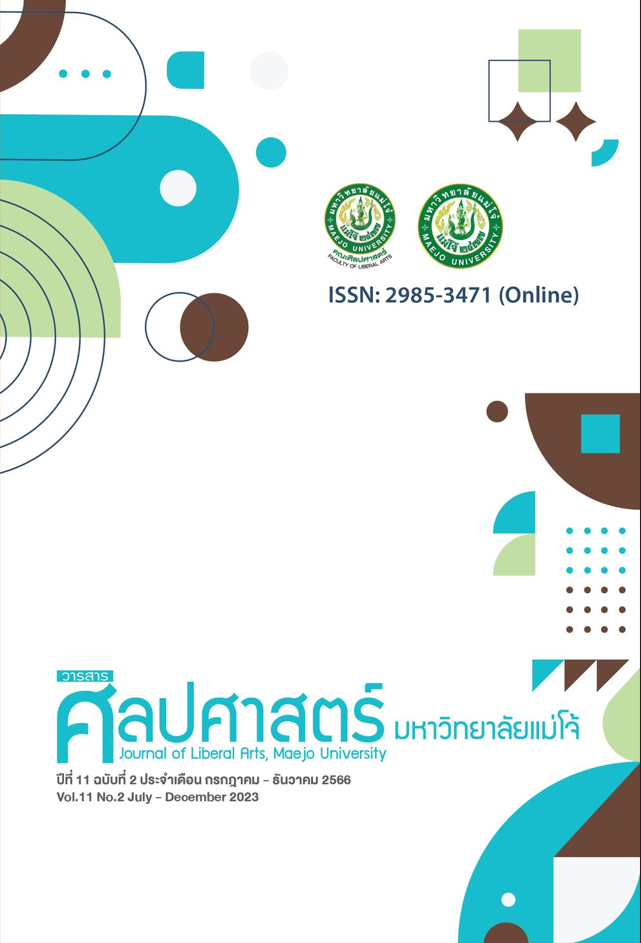Relationships between Perfectionism trait and Anxiety of Undergraduate students: The Mediating Role of Self-compassion
Main Article Content
Abstract
The purpose of this research was to examine the relationship between perfectionism trait and anxiety among undergraduate students with self-compassion as a mediator. The participants were 402 undergraduate students obtained by convenience sampling. The research instruments consisted of Demographic questionnaire, The Revised Almost Perfect scale, A Depression Anxiety Stress scales (DASS-21), and The Self-compassion scale. The data was analyzed by hierarchical multiple regression analysis with Model 4 of the Process Macro.
The results showed that self-compassion had a partial mediating role in the relationship between perfectionism trait and anxiety of undergraduate students. The findings indicated that the influence of perfectionism trait on anxiety was mediated by self-compassion which mean that when student have self-compassion, The students with perfectionism tended to have lower anxiety. Therefore, the universities should promote activities and training programs enhance self-compassion among perfectionism students.
Article Details

This work is licensed under a Creative Commons Attribution-NonCommercial-NoDerivatives 4.0 International License.
ต้นฉบับที่ได้รับการตีพิมพ์ในวารสารคณะศิลปศาสตร์ มหาวิทยาลัยแม่โจ้ ถือเป็นกรรมสิทธิ์ของมหาวิทยาลัยแม่โจ้ ห้ามนำข้อความทั้งหมดหรือบางส่วนไปพิมพ์ซ้ำ เว้นเสียแต่จะได้รับอนุญาตจากมหาวิทยาลัยฯ เป็นลายลักษณ์อักษรReferences
รายการอ้างอิง
กิดานันท์ ชำนาญเวช, นิรนาท แสนสา, นิธิพัฒน์ เมฆขจร, และสมร แสงอรุณ. (2561). การศึกษาและพัฒนาความเมตตากรุณาต่อตนเองของนักศึกษา มหาวิทยาลัย
ราชภัฏ ด้วยกลุ่มการปรึกษาเชิงจิตวิทยาแบบบูรณาการ. Veridian E-Journal Silpakorn University, 11(3). สืบค้น 4 พฤศจิกายน 2565, จาก
https://he02.tci-thaijo.org/index.php/Veridian-E-Journal/article/view/166063/120193
บุณยวีร์ ขำภักดี และ ณฐวัฒน์ ล่องทอง. (2565). ผลของการให้การปรึกษากลุ่มแบบผสมผสานที่มีต่อความเมตตาตนเองของนักศึกษาที่มีความโน้มเอียงเป็นผู้นิยม
ความสมบูรณ์แบบชนิดปรับตัวยาก. วารสารจิตวิทยาคลินิกไทย, 53(1), 1-12. สืบค้น 18 กรกฎาคม 2565, จาก https://so03.tci-thaijo.org/index.php/tci-
thaijclinicpsy/article/download/254011/172963/962863
ทัศนีย์ หอมกลิ่น, อารยา ผลธัญญา, และไชยันต์ สกุลศรีประเสริฐ. (2565). อิทธิพลของความเครียดในการเรียนที่มีผลต่อผลการเรียนและความผูกพันในการเรียน
ของนักศึกษาระดับปริญญาตรี โดยมีทุนทางจิตวิทยาเป็นตัวแปรคั่นกลาง. วารสารปัญญาภิวัฒน์, 14(2). สืบค้น 14 ตุลาคม 2565, จาก https://so05.tci-
thaijo.org/index.php/pimjournal/article/view/251327
ภัทรพงษ์ ธำรงปรีชาชัย. (2563). อิทธิพลของความเมตตากรุณาต่อตนเองที่มีต่อพรหมวิหารสี่และความสุขของจิตอาสาในกรุงเทพมหานครและเขตปริมณฑล.
(วิทยานิพนธ์ปริญญามหาบัณฑิต, มหาวิทยาลัยเชียงใหม่ เชียงใหม่). สืบค้นจาก http://cmuir.cmu.ac.th/jspui/handle/6653943832/69542
ภัสธารีย์ พลไพโรจน์, กันตวรรณ คงแป้น, และสิริมนัส พะชะนะ. (2559). ความสัมพันธ์ระหว่างความวิตกกังวล ความเมตตากรุณาต่อตนเอง และการริเริ่มพัฒนาความ
งอกงามแห่ง. (ปริญญานิพนธ์, จุฬาลงกรณ์มหาวิทยาลัย กรุงเทพฯ). สืบค้นจาก http://cuir.car.chula.ac.th/handle/123456789/57884
รัตติกาล จินดาคี. (2541). ความสัมพันธ์ระหว่างความวิตกกังวลกับผลสัมฤทธิ์ทางการเรียนคณิตศาสตร์ของนักเรียนชั้นประถมศึกษา. (วิทยานิพนธ์ปริญญามหา
บัณฑิต, มหาวิทยาลัยเชียงใหม่ เชียงใหม่). สืบค้นจาก http://cmuir.cmu.ac.th/jspui/handle/6653943832/23633
วัชราวดี บุญสร้างสม. (2556). ความสัมพันธ์ระหว่างการรับรู้ความเครียดและความสุขในนิสิตนักศึกษามหาวิทยาลัย โดยมีความเมตตากรุณาต่อตนเองเป็นตัวแปรส่ง
ผ่าน. (วิทยานิพนธ์ปริญญามหาบัณฑิต, จุฬาลงกรณ์มหาวิทยาลัย กรุงเทพฯ). สืบค้นจาก http://cuir.car.chula.ac.th/handle/123456789/42630
สุพิชญา โพธิ์ไพบูลย์, อารยา ผลธัญญา, และไชยันต์ สกุลศรีประเสริฐ. (2565).ความสัมพันธ์เชิงสาเหตุระหว่างความผูกพันทางอารมณ์และภาวะซึมเศร้าของ
นักศึกษาโดยมีความเมตตาต่อตนเองเป็นตัวแปรส่งผ่าน. มนุษยศาสตร์สาร, 23(3). สืบค้น 12 กุมภาพันธ์ 2566, จาก https://so03.tci-
thaijo.org/index.php/JHUMANS/article/view/258705
Reference
Asif, S., Mudassar, A., Shahzad, T. Z., Raouf, M., & Pervaiz, T. (2020). Frequency of depression, anxiety and stress among university
students. Pakistan Journal of Medical Sciences, 36(5), 971-976. Retrieved July 18, 2022, form https://doi.org/10.12669/pjms.36.5.1873
Cassisa, C., & Neff, K. D. (2019). The promise of self-compassion for solos. GPSolo, 36(3), 18-21. Retrieved July 18, 2022, from https://self-
compassion.org/wp-content/uploads/2019/09/cassisa2019.pdf
Chi, X., Jiang, W., Guo, T., Hall, D. L., Luberto, C. M., & Zou, L. (2022). Relationship between adverse childhood experiences and anxiety
symptoms among Chinese adolescents: The role of self-compassion and social support. Current Psychology. Retrieved July 18, 2022,
form https://doi.org/10.1007/s12144-021-02534-5
Clark, D. A., & Beck, A. T. (2010). Cognitive Therapy of Anxiety Disorders: Science and practice. New York: Guilford Press.
Dundas, I., Svendsen, J. L., Wiker, A. S., Granli, K. V. & Schanche E. (2016). Self-compassion and depressive symptoms in a Norwegian
student sample. Nordic Psychology, 68, 58-72. Retrieved July 18, 2022, form https://doi.org/10.1080/19012276.2015.1071203
Flett, G. L., Greene, A., & Hewitt, P. L. (2004). Dimensions of Perfectionism and Anxiety Sensitivity. Journal of Rational-Emotive and
Cognitive-Behavior Therapy, 22, 39-57. Retrieved October 23, 2022, form https://doi.org/10.1023/B:JORE.0000011576.18538.8e
Gnilka, P. B., Ashby, J. S., & Noble, C. M. (2012). Multidimensional Perfectionism and Anxiety: Differences Among Individuals With
Perfectionism and Tests of a Coping-Mediation Model. Journal of Counseling & Development, 90, 427-436. Retrieved August 8, 2022,
form https://doi.org/10.1002/j.1556-6676.2012.00054.x
Kawamura, K. Y., Hunt, S. L., Frost, R. O., & DiBartolo, P. M. (2001). Perfectionism, Anxiety, and Depression: Are the Relationships
Independent?. Cognitive Therapy and Research, 25, 291–301. Retrieved August 8, 2022, form
https://doi.org/10.1023/A:1010736529013
Kristin, E. M., & Aimee, C. A. (2016). Self-Compassion as a Mediator of Maladaptive Perfectionism and Depressive Symptoms in College
Students. Journal of College Student Psychotherapy, 30, 132-145. Retrieved July 18, 2022, form
https://doi.org/10.1080/87568225.2016.1140991
Leary, M. R., Tate, E. B., Adams, C. E., Batts Allen, A., & Hancock, J. (2007). Self-compassion and reactions to unpleasant self-relevant
events: The implications of treating oneself kindly. Journal of Personality and Social Psychology, 92(5), 887–904. Retrieved July 18,
, from https://doi.org/10.1037/0022-3514.92.5.887
Neff, K. D. (2003). Self-Compassion: An alternative conceptualization of a healthy attitude toward
oneself. Self and Identity, 2, 85-102. Retrieved November 4, 2022, form
https://doi.org/10.1080/15298860309032
Neff, K. D., Kirkpatrick, K. L., & Rude, S. S. (2007). Self-compassion and adaptive psychological functioning. Journal of Research in
Personality, 41, 139-154. Retrieved July 18, 2022, form https://doi.org/10.1016/j.jrp.2006.03.004
Neff, K. D., & McGehee P. (2010). Self-compassion and Psychological Resilience Among Adolescents and Young Adults. Self and Identity, 9,
-240. Retrieved August 8, 2022, form https://doi.org/10.1080/15298860902979307
Oei, T. P., Sawang, S., Goh, Y. W., Mukhtar, F. (2014). Using the Depression Anxiety Stress Scale 21 (DASS-21) across cultures. International
Journal of Psychology, 48, 1018-29. Retrieved August 25,, 2022, form https://doi.org/10.1080/00207594.2012.755535
Rebecca, J. L., & Fraenze K. (2020) A multidimensional approach to perfectionism and self-compassion. Self and Identity, 19, 757-783.
Retrieved July 18, 2022, form https://doi.org/10.1080/15298868.2019.1669695
Stoeber, J., Lalova, A. V., & Lumley, E. J. (2020). Perfectionism, (self-)compassion, and subjective well-being: A mediation model. Personality
and Individual Differences, 154. Retrieved October 23, 2022, form https://doi.org/10.1016/j.paid.2019.109708
Sutton, J. (2021). What Is Perfectionism According to Psychology? 7 Examples. Retrieved August 8, 2022, form
https://positivepsychology.com/perfectionism/
Zhang, B., Liang, H., Luo, Y., Peng, Y., Qiu, Z., Mao, H.,…Xiong, S. (2022). Loneliness and mobile phone
addiction in Chinese college students: a moderated mediation model. Journal of Psychology in Africa, 32, 605-610. Retrieved August
, 2022, form https://doi.org/10.1080/14330237.2022.2121474

